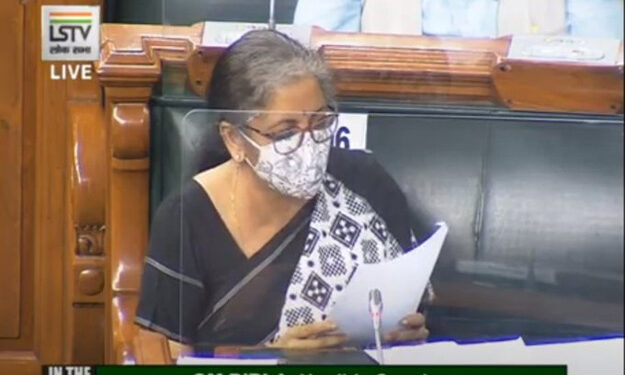NE NEWS SERVICE
NEW DELHI, NOV 23
Finance Minister Nirmala Sitharaman on Monday assured the industry that the momentum of economic reforms will continue to make India a hotspot of global investment.
Delegation led by Shri Satish Marathe, Founder Member & Patron of Sahakar Bharati and Director, Central Board of @RBI called on Smt @nsitharaman, earlier today. pic.twitter.com/GNMGF8h9IH
— Nirmala Sitharaman Office (@nsitharamanoffc) November 23, 2020
India has turned the crisis created by the COVID-19 pandemic into an opportunity to push the economic reforms, which remained pending for decades, she said while addressing the National MNC’s Conference 2020 organised by industry chamber CII.
“Even at the time (of) COVID pandemic, the Prime Minister has not lost an opportunity to take deep reforms to undertake those kinds of reforms which have not seen the light of the day over the decades. The momentum for reform shall continue. Several more active reform-related steps are being taken up,” Sitharaman said.
Today not just the MNC’s, but the entire industry & the economy is facing a reset exercise of doing business and this is being further strengthened by the Govt’s #AtmanirbharBharat prog.~ @nsitharaman, Hon. Minister of Finance & Corporate Affairs at #CII_MNCsConf2020 @FinMinIndia pic.twitter.com/XrO0UtyQHz
— Confederation of Indian Industry (@FollowCII) November 23, 2020
The financial sector is being professionalised and the government will continue with the disinvestment agenda, she added.
Sitharaman said the government will make sure that there is greater momentum in bringing out the new privatisation policy for public sector units.
The finance minister had in May announced that there will be a maximum of four public sector companies in strategic sectors, while state-owned firms in other segments will eventually be privatised.
This will be part of a new coherent Public Sector Enterprises Policy to be formulated to push reforms in central public sector enterprises (CPSEs), she had said while announcing the fifth and last tranche of over Rs 20 lakh crore ”Atmanirbhar Bharat Abhiyan” package.
During the first tenure of Prime Minister Narendra Modi, she said, you had reforms like direct benefit transfer using technology, the introduction of Goods and Services Tax (GST), Insolvency and Bankruptcy Code (IBC), etc.
“We are strengthening the National Company Law Tribunal and National Company Law Appellate Tribunal through which the company law related tribunal will function far more efficiently. Commercial courts are being set up,” she said.
Concerning bringing in further ease for global players to set up their shops, the finance minister said an effective unified single window will be made available so that access to regulators, policymakers, and facilitators are all available at one point.
Referring to the Prime Minister’s meeting with representatives from 20 of the world”s largest pension and sovereign wealth funds earlier this month, she said the emphasis of the upcoming budget is going to be what the global investor community exactly looking for from India in this changing environment.
After the engagement, the Prime Minister has been meeting with them one on one virtually again and talking to them about their concerns, and how best, they would expect India to do things in the policy space, she said.
To attract funding in the key sectors of the economy, the finance minister said, the Budget announcement of tax exemption for sovereign funds was fulfilled despite the COVID-19 pandemic when most countries were under lockdown.
“We have had interest being expressed by several sovereign funds,” Sitharaman said.
On further liberalisation, she said the government has opened the space sector, nuclear power sector, and the defence production sector for the private sector.
“Since the government came back in 2019, we have been taking strong reform-related measures. The reduction in corporate tax in September 2019 to 15 percent is among one of the lowest in the world,” she added.
The faceless assessment will also be introduced in indirect tax related cases to avoid the element of discretion, the minister said.
Sitharaman acknowledged that there was a need to expedite the advance price agreements between India and other nations.
“I agree Advance Pricing Agreements can be expedited otherwise it defeats the very purpose,” she said.
Under advance pricing agreements, the tax department and taxpayer agree for a maximum period of 5 years in respect of international transactions to determine how to arm’s length price is to be determined with an associated enterprise.
On dispute resolution, she said, “We have made our intentions very clear that is why we came out with two schemes – Vishwas and Vidad Se Vishwas – so that some of the disputes festering for a very long time could be settled”.
There is a need for a robust mechanism through which disputes are resolved at the earliest and if possible on a real-time basis, she said, adding the government will see what it can do in that regard.
“All enterprises, MNCs and India Inc – big, medium and small enterprises – are facing a reset exercise in doing business. We will have to make sure that policies are right to make India an attractive investment destination,” she said.
In furtherance of its reform agenda, she said the government is ensuring the setting up of dedicated special manufacturing zones for the production of Pharma, Medical Devices, and APIs in 6 states.










